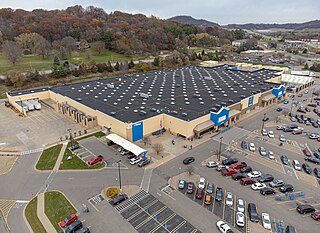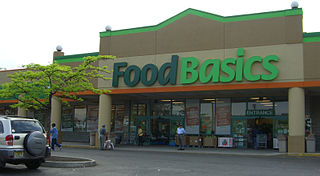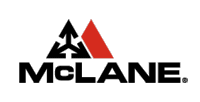
Woolco was an American-based discount retail chain. It was founded in 1962 in Columbus, Ohio, by the F. W. Woolworth Company. It was a full-line discount department store unlike the five-and-dime Woolworth stores which operated at the time. At its peak, Woolco had hundreds of stores in the US, as well as in Canada and the United Kingdom. While the American stores were closed in 1983, the chain remained active in Canada until it was sold in 1994 to rival Walmart, which was looking to enter the Canadian market. All of the former UK Woolco stores were sold by Kingfisher, which had bought the UK Woolworth business, to Gateway which subsequently sold them to Asda.
A discount store or discounter offers a retail format in which products are sold at prices that are in principle lower than an actual or supposed "full retail price". Discounters rely on bulk purchasing and efficient distribution to keep down costs.
Walden Book Company, Inc., doing business as, Waldenbooks, was an American shopping mall-based bookstore chain and a subsidiary of Borders Group. The chain also ran a video game and software chain under the name Waldensoftware, as well as a children's educational toy chain under Walden Kids. In 2011, the chain was liquidated in bankruptcy.
Venture Stores, Inc. was a chain of retail stores aimed at the discount department-store market. John Geisse, formerly of Target Stores, and May Department Stores' executive vice president, Dave Babcock, founded the chain in 1968. Venture Stores expanded to operate over 70 stores with major market share in St. Louis, Chicago, and Kansas City, and expanded across various areas in the United States over a period of nearly 30 years, becoming the largest discount chain in Chicago. In January 1998, Venture Stores entered a Chapter 11 bankruptcy and closed within six months.

McCrory Stores or J.G. McCrory's was a chain of five and dime stores in the United States based in York, Pennsylvania. The stores typically sold shoes, clothing, housewares, fabrics, penny candy, toys, cosmetics, and often included a lunch counter or snack bar. They also exclusively sold Oriole Records, one of the most popular "dime store labels" from 1921 to 1938.

G.C. Murphy was a chain of five and dime or variety stores in the United States from 1906 to 2002. They also operated Murphy's Mart, Bargain World, Terry & Ferris and Bruners, and Cobbs stores.
Jamesway Corporation, more commonly known as Jamesway, was a chain of discount department stores based in Secaucus, New Jersey. It was founded in 1961 with a single store in Jamestown, New York, ultimately growing into a chain that, at its peak, operated 138 stores throughout the Northeast and mid-Atlantic regions.

Cub is an American supermarket chain. It operates stores in Minnesota and Illinois. The company is a wholly owned subsidiary of United Natural Foods, based in Providence, Rhode Island.

Zayre was a chain of discount stores that operated in the eastern half of the United States from 1956 to 1990. The company's headquarters were in Framingham, Massachusetts. In October 1988, Zayre's parent company, Zayre Corp., sold the stores to the competing Ames Department Stores, Inc. chain. In June 1989, Zayre Corp. merged with one of its subsidiaries, The TJX Companies, parent company of T.J. Maxx, which still exists today. A number of stores retained the Zayre name until 1990, by which time all stores were either closed or converted into Ames stores.

A big-box store, a hyperstore, a supercenter, a superstore, or a megastore is a physically large retail establishment, usually part of a chain of stores. The term sometimes also refers, by extension, to the company that operates the store. The term "big-box" references the typical appearance of buildings occupied by such stores.
Mammoth Mart was a discount department store chain, located in the northeastern United States, primarily in the New England area. The chain was founded by Max Coffman and Henry Gornstein in Framingham, Massachusetts in 1956, and was something of a prototype for the large, downscale department store, selling housewares, hardware and clothing in stark, unfussy buildings, usually in suburban shopping center locations. Other discount department store retailers like K-Mart, Zayre, and Bradlees would subsequently expand on this concept.

FedMart was a chain of discount department stores started by Sol Price, who later founded Price Club. Originally a discount department store open to government employees paying a $2 per family membership fee, FedMart earned four times more than its investors had projected in its first year. Over the next 20 years, FedMart grew to include 45 stores, mostly in California, and the Southwest in a chain that generated over $300 million in annual sales. The business expanded to several states in the Southwest United States. Many stores were previous White Front or Two Guys locations. Price later sold two-thirds of the chain to Hugo Mann, a German retail chain, in 1975 and was forced out of his leadership position the following year. FedMart went out of business in 1982.
Goldblatt's was an American chain of local discount stores that operated in Chicago, Illinois, as well as Indiana, Michigan and Wisconsin. Founded in 1914, the chain grew to more than twenty stores at its peak, gradually closing some stores in the 1990s and selling others to Ames before finally closing completely in 2000.

Gamble-Skogmo Inc. was a conglomerate of retail chains and other businesses that was headquartered in St. Louis Park, Minnesota. Business operated or franchised by Gamble-Skogmo included Gambles hardware and auto supply stores, Woman's World and Mode O'Day clothing stores, J.M. McDonald department stores, Leath Furniture stores, Tempo and Buckeye Mart Discount Stores, Howard's Brandiscount Department Stores, Rasco Variety Stores, Sarco Outlet Stores, Toy World, Rasco-Tempo, Red Owl Grocery, Snyder Drug and the Aldens mail-order company. In Canada, retail operations consisted of Macleods Hardware, based in Winnipeg, Manitoba, and Stedmans Department Stores, based in Toronto, Ontario. Gamble-Skogmo carried a line of home appliances, including radios, televisions, refrigerators, and freezers, under the Coronado brand name.

Food Basics was a no-frills discount supermarket chain owned and operated by The Great Atlantic & Pacific Tea Company in the northeastern United States.

McLane is an American wholesale supply chain services company that distributes products to convenience stores, discount retailers, wholesale clubs, drug stores, military bases, fast-food restaurants, and casual dining restaurants throughout the United States. It is also a wholesale distributor of distilled beverages in some parts of the country.

John Francis Geisse was an American businessman. He founded three successful retail chains: Target Discount Stores, Venture Stores, and The Wholesale Club.

Fishers Big Wheel, sometimes known as just Big Wheel, was a discount department store chain based in New Castle, Pennsylvania, United States. The company operated stores under the Fisher's Big Wheel and Buy Smart names. At its peak, the chain comprised more than 100 stores in the Northeastern and Midwestern United States. The chain declared bankruptcy in 1993, selling some stores to Pamida and closing others. The chain closed in 1994.
National Record Mart, known as NRM for short, was an American music store chain. The first music store chain in the United States, it was founded in 1937 in Pittsburgh, Pennsylvania, and operated more than 130 locations at its peak. Other stores under its ownership included Oasis, Music X, Waves Music, and Vibes. The chain filed for bankruptcy in 2001 and closed the last of its stores in 2002.













